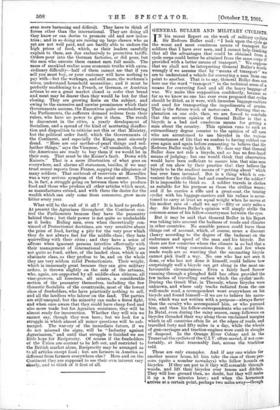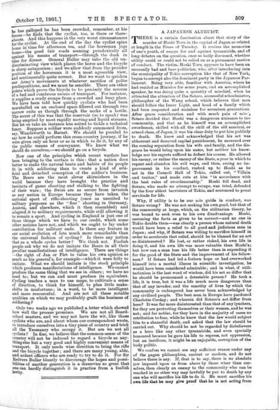GENERAL BULLER AND MILITARY CYCLISTS.
IN his recent Report on the work of military cyclists Sir Redvers Buller said : " I look upon the cycle as the worst and most cumbrous means of transport for soldiers that I have ever seen, and I cannot help thinking that all the advantages that could be obtained from a cycle corps could better be attained from the same corps if provided with a better means of transport." We suppose that we shall not be interpreting General Buller's words wrongly if we assume that by " means of transport" we are to understand a vehicle for conveying a man from one point to another. That is to say, General Buller does not here use the word " transport " in the technical sense of a means for conveying food and all the heavy baggage of war. We make this supposition confidently, because so far as we know no one has ever even proposed that cycles should be fitted, as it were,. with immense luggage-carriers and used for transporting the impedimenta of armies. That is the future work of motor-cars. Putting that ex- planation on one side, then, we are forced to conclude, that the serious opinion of General Buller is that a bicycle is a bad and cumbrous means for getting a, man about the country. This opinion runs to such an extraordinary degree counter to the opinion of all men who are accustomed to use bicycles in the various circumstances of life that we confess to having rubbed our eyes again and again before consenting to believe that Sir Redvers Buller really holds it. We dare say that General Buller does not ride a bicycle, and so has no first-hand means of judging; but one would think that observation would have been sufficient to assure him that nine men out of ten show by their practice that they believe the bicycle to be the readiest means of "getting about" which has Over been invented. But is a thing which is con- venient for the civilian bad and cumbrous for the soldier? It is impossible to think so. A soldier travels in clothes as suitable for his purpose as those the civilian wears; and if he carries a rifle and a great-coat. the touring cyclist with his luggage-carriers and his valises is accus- tomed to carry at least an equal weight when he moves at his modest rate of—shall we say P—fifty or sixty miles a day. Sir Redvers Buller's opinion will simply strike the common-sense of his fellow-countrymen between the eyes.
But it may be said that General Buller in his Report was taking into account the badness of roads and climates in other countries. No sensible person could leave these things out of account, which, of course, mean a discount (heavy according to the degree of the badness) on the endurance and speed of the man and his bicycle. But there are few countries where the climate is so bad that a man cannot wring concessions from it, and few where made roads are so wanting that the unexacting bicycle cannot pick itself a way. No one who has not seen it done, or who has not done it himself, could believe how surprisingly well a bicycle can get along in the most un- favourable circumstances. Even a fairly hard furrow running through a ploughed field has often provided the few inches of travelling surface which the cyclist 'needs. During the Greek War, in Thessaly, where bicycles were unknown, and where only tracks radiated from the one well-made road, a correspondent went everywhere on his bicycle and found himself—if we are to believe his narra- tive, which was not written with a purpose—always fleeter than the cavalry who accompanied him, or who pursued him, and than his fellow-correspondents who envied him. In Natal, even during the rainy season, camp followers on bicycles threaded their way along those unclaimed margins which in all countries often lie at the edges of roads, and travelled forty and fifty miles in a day, while the wheels of gun-carriages and traction-engines were sunk in sloughs of despond. In the Orange River Colony and in the Transvaal the cyclists of the C.I.V. often moved, if not com- fortably, at least reasonably fast, across the trackless veld.
These are only examples. And if any one wishes for another nearer home, let him take the case of those per- sons (quite a number nowadays) who follow hounds on bicycles.. If they are put to it'they will scramble through woods, and lift their bicycles over fences and ditches. They will lose ground then, no doubt, but they will make it up a few minutes later; when the horseman arrives at a certain point, peraps two miles away—though be has galloped he has been crowded, remember, at his fences—he finds that the cyclist, too, is there or there- abouts. And this happens in the very worst circumstances for the cyclist. At the end of the day the cyclist spins borne in time for afternoon tea, and the horseman jogs home—the good fair roads seeming paradoxically all against his means of transport—through the dusk in time for dinner. General Buller may take the old un- discriminating view which places the horse and the bicycle in sharp antagonism ; and we allow that from the prouder position of the horseman it is a most agreeable view, and sentimentally quite correct. But we want to quicken our Army's movements at whatever sacrifice of polite predispositions, and we must be sensible. There are other points which prove the bicycle to be precisely the reverse of a bad and cumbrous means of transport. , For instance, it supplies a ready escape from a crowded and busy place. We have been told how quickly cyclists who had been marshalled on an enclosed space filtered out through two narrow exits as though through the necks of a bottle. The secret of this was that the reservoir (so to speak) was being emptied by most rapidly moving and liquid streams. But let us take an instance less suited to tickle a technical fancy. Suppose a soldier were suddenly summoned from, say, Wandsworth to Barnet. We should be puzzled to say. low he could perform this cross-country journey, if he were given only an hour or so in which to do it, by any of the public means of conveyance. We know what we should do ourselves,—we should go on a bicycle.
Now one of the principles which recent warfare has been bringing to the surface is this : that a nation does better to make the natural bents and habits of its people fit in with soldiering than to create a kind of arti- ficial and detached conception of the soldier's business. The Boers are the most clever skirmishers in the world because they have brought the practice and instincts of game shooting and stalking to the fighting of their wars ; the Swiss are as secure from invasion as any nation in Europe because they have taken the national sport of rifle-shooting (once as unsuited to military purposes as the "fine " shooting in Germany, Austria., and elsewhere, which it then resembled) and adapted it to military requirements, while still allowing it to remain a sport. And cycling in England is just one of those things which we have to our credit, which some other nations have not, and which we ought to lay under contribution for military ends. Is there any feature in our social evolution of late much more remarkable than the universal fashion of cycling ? Is there any nation that as a whole cycles better ? We think not. Foolish people ask why we do not imitate the Boers in all their peculiar manifestations of intelligence. There are things —the right of Jan or Piet to value his own opinion as much as his general's, for example—which it were folly to imitate. What we should imitate is the stock principle which produces manifestations of intelligence. We cannot produce the same thing that we see in others ; we have no need to ; but we can and must produce its equivalent. Cycling teaches a man to use maps, to cultivate a sense of direction, to think for himself, to plan little make- shifts in misfortune ; in a word, to be more intelligent and more resourceful. And are not all these notable qualities on which we may profitably graft the business of soldiering ?
Only two weeks ago we published a letter which showed how well the process promises. We are not all Board- school masters, and we may:not have the wit, like those eyelids who are, and about whom our correspondent wrote, to introduce ourselves into a tiny piece of country and trick all the Yeomanry who occupy it. But are we not all cyclists ? In fine, we believe that the common-sense of the country will not be induced to regard a bicycle as any- thing else but a very good and highly convenient means of transport. It only needs wise direction to bring the rifle and the bicycle together ; and there are many young, able, and ardent officers who are ready to try to do it. For Sir Beavers Buller bluntly to discourage the hopes and poasi- bilk* of another generation is a disservice so great that one can hardly distinguish it in practice from a foolish levity.















































 Previous page
Previous page